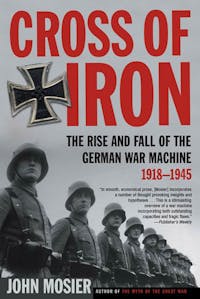Cross of Iron
The Rise and Fall of the German War Machine, 1918-1945
 Download image
Download image
ISBN10: 0805083219
ISBN13: 9780805083217
Trade Paperback
336 Pages
$22.99
CA$32.99
Acclaimed for his revisionist history of the German Army in World War I, John Mosier continues his work in Cross of Iron, offering an intimate portrait of the twentieth-century German army from its inception, through World War I and the interwar years, to World War II and its climax in 1945.
World War I has inspired a vast mythology of bravery and carnage, told largely by the victors, that has fascinated readers for decades. Many have come to believe that the fast ascendancy of the Allied army, matched by the failure of a German army shackled by its rigidity, led to the war's outcome. Mosier demystifies the strategic and tactical realities to explain that it was Germany's military culture that provided it with the advantage in the first war. Likewise, Cross of Iron offers revelations regarding the weapons of World War II, forcing a reevaluation of the reasons behind the French withdrawal, the Russian contribution, and Hitler as military thinker. Mosier lays to rest the notion that the army, as opposed to the SS, fought a clean and traditional war. Finally, he demonstrates how the German war machine succeeded against more powerful Allied armies until, in both wars, it was crushed by U.S. intervention.
Reviews
Praise for Cross of Iron
"Cross of Iron is an important, superbly researched reappraisal of the fabled Wehrmacht in both world wars. From the battlefields of France during World War I, through history's most devastating war, John Mosier shatters a long-held mythology about the German Army, and reveals how its officers permitted one of the world's greatest armies to lose its honor and become the willing tool of Adolf Hitler. Those who believe that we have learned everything there is to know about World War II will view the legendary German war machine and its history in an entirely new light after reading this provocative book."—Carlo D'Este, author of Eisenhower: A Soldier's Life and Patton: A Genius For War
"This is a book that will confound almost everyone's assumptions about both world wars. The squawks will be loudest in London, Paris and Moscow. It also explains how and why the German army consistently outfought its enemies—and ultimately lost."—Thomas Fleming, author of The Illusion of Victory: America in World War I
"Mosier is a literature professor and film critic who has dedicated much of his career to analyzing the military history of World Wars I and II. His books, The Myth of the Great War and The Blitzkrieg Myth, challenged conventional assessments of German technological and tactical success in those wars. Targeting the mythology surrounding the Wehrmacht and the officer class, Mosier now continues the myth busting . . . Locating the effectiveness of the German army in its 'institutional memory'—its ability to quickly adapt to new technology and, particularly, learn from tactical mistakes made in World War I—Mosier advances what is essentially an information-science approach to military history. Combined with Mosier's willingness to boldly charge down prevailing assumptions, this approach to the tactical side of World War II is both a provocative argument and a lively read . . . [T]his book will further cement Mosier's position among military historians."—Brendan Driscoll, Booklist
"Mosier is a professor of English who has developed a second career writing on the world wars. Here he credits the German army's operational effectiveness in two world wars to leadership, doctrine and, above all, institutional memory. The Germans addressed many of modern warfare's fundamental problems in WWI. They built on their experience during the years between the wars, integrating new technologies as they emerged. Quickness of reaction and speed of execution in a framework of combined arms tactics gave the Wehrmacht temporary mastery of Europe in 1939–1942. [Mosier] presents [his thesis] in smooth, economical prose, incorporating a number of thought provoking insights and hypotheses . . . [T]his is a stimulating overview of a war machine incorporating both outstanding capacities and tragic flaws."—Publishers Weekly
Reviews from Goodreads
BOOK EXCERPTS
Read an Excerpt
Introduction: Truth and Error
The truth must be repeated over and over again; because error is repeatedly preached among us, and not only by individuals, but by the masses. In periodicals and cyclopedias, in schools and universities—everywhere,...


